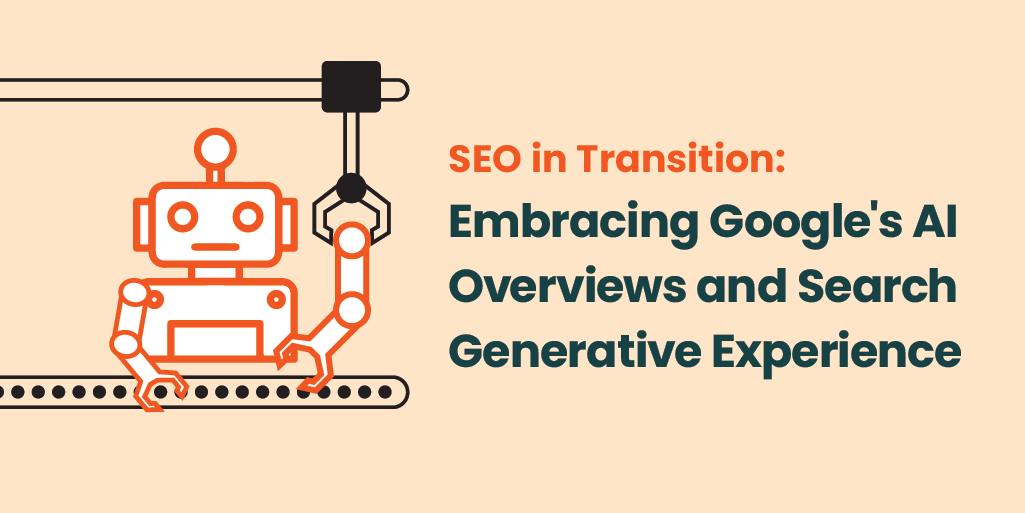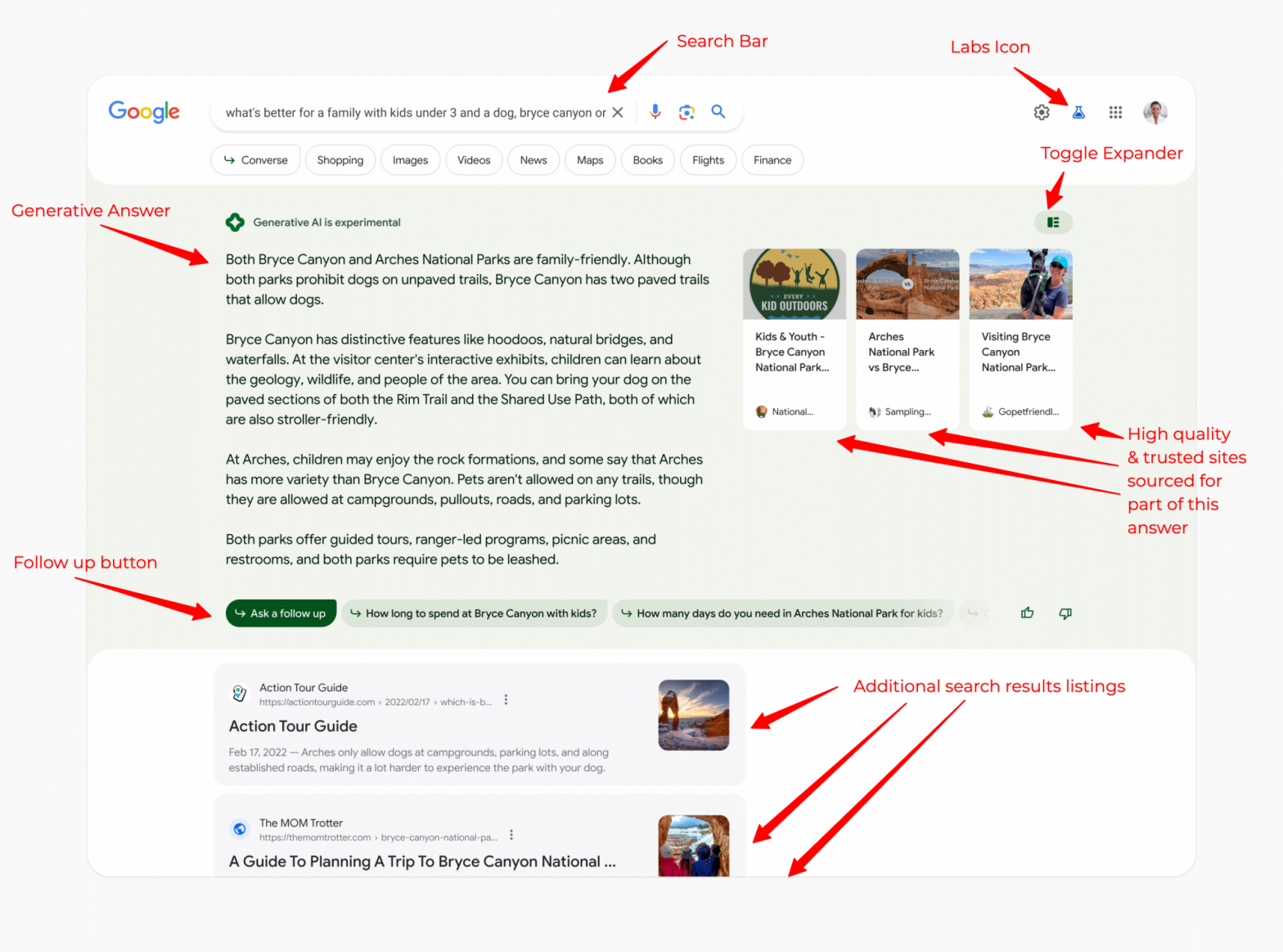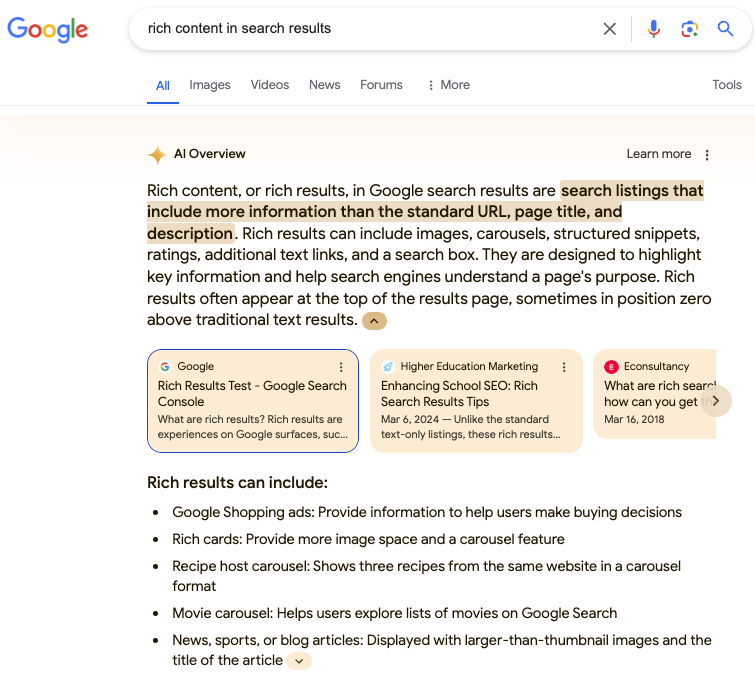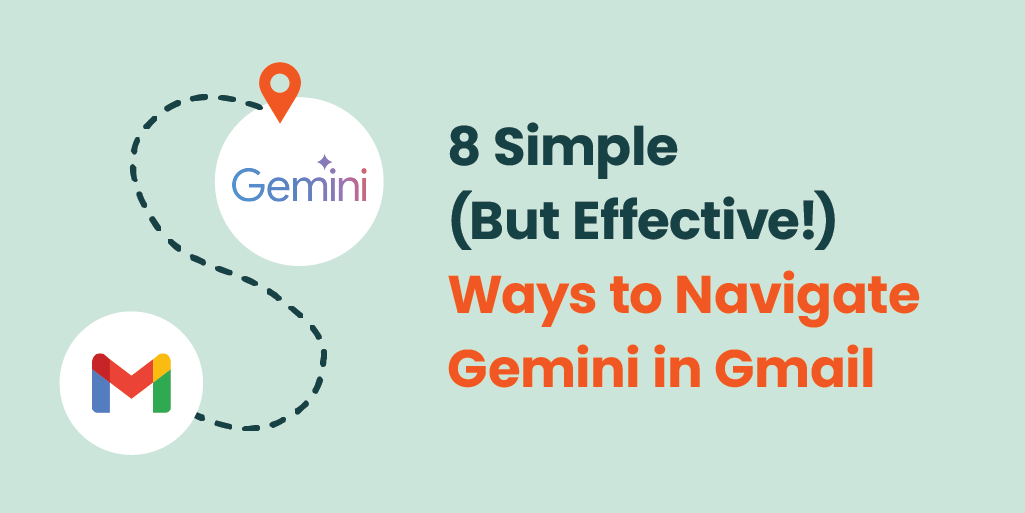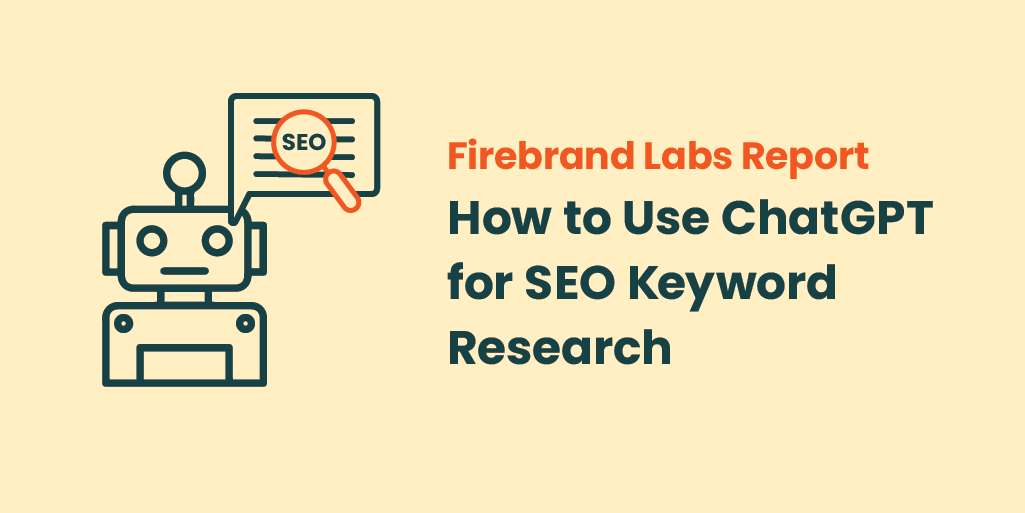In a move long-dreaded by SEO professionals, Google Search Generative Experience (SGE) is moving out of its experimental phase in Search Labs and entering the public domain with the rollout of AI Overviews. While these innovative AI-generated summaries are set to transform the way users interact with search results, there exists much speculation — mostly negative — about the impacts on businesses and publishers who rely on Google organic search traffic. Fear not, as this leap forward in technology brings both opportunities and challenges for businesses. Read on to learn why most B2B organizations stand to benefit from Google AI and SEO.
What Is Search Generative Experience?
Simply put, Search Generative Experience (SGE) is Google’s transformative approach to the search experience, powered by generative AI. This change promises to help searchers get more from a single search and display that information in an interactive, personalized, and conversational way. SGE has so far only been enabled for users that opt-in via Google Search Labs where they can experience these new features as Google fine-tunes them in preparation for public rollout. The Google generative search experience will include:
- AI-powered overviews offering quick and comprehensive answers to questions and additional relevant content from publishers, creators, retailers, businesses, and more.
- Easier ways for users to follow up on search queries — like refining what they’re looking for or exploring a new direction — without having to restate context.
- Vertical experiences where Generative AI in Search will provide additional considerations relevant to searches, giving a more comprehensive result.
- Generative AI image and video capabilities with both image and video similarity search and even the ability to upload a video or image to ask questions about it.
- Image generation will give you the ability to generate images from text prompts.
- An improved paid search experience with new creative options for advertisers.
What Are Google AI Overviews?
At its annual I/O developer conference, Google announced that AI-powered overviews — the first major part of SGE — would be rolled out publicly for U.S. search results. AI overview will be the cornerstone of SGE, providing concise, AI-generated summaries of search results to complex and more conversational queries, enhancing the user experience. Additionally, it can help with planning tasks like creating meal plans or vacation itineraries, offer categorized search results for brainstorming and idea exploration, as well as answer questions using videos for visual troubleshooting.
All of this is powered by a variety of LLMs—including Gemini, Google’s AI Chatbot—but what sets Google SGE apart from ChatGPT is that it has also been purposefully trained to carry out tasks specific to Search, including identifying high-quality web results (webpages) that corroborate the information presented in the output.
How are Search Generative Experience and AI Overviews Going to Affect Organic Search Traffic?
Only time will tell for certain how SGE will affect the bottom line, but many businesses and SEOs are worried about declining organic web traffic as AI Overviews begin to roll out. The concern is that as AI Overview uses LLMs and existing high-quality web sources to answer questions more easily, searchers who would typically click on one or more of the top search results to find answers may not have to click on anything at all. This is what is called Zero Click searches, since there’s not click to the publisher after the user has their query resolved. Combined with the fact that AI Overviews take up valuable search real estate and could bury traditional “blue link” web results, clickthrough rates may be negatively impacted.
One theory is that AI Overviews will affect B2C websites more than B2B as the AI has an easier time deciding what info to show as accurate when it comes to less technical queries. Google has even claimed that:
“People use search more with AI Overview and with AI Overviews, people are visiting a greater diversity of websites for help with more complex questions. And we see that the links included in AI Overviews get more clicks than if the page had appeared as a traditional web listing for that query.”
Rest assured, there are some tactics that SEOs can adopt to protect and even improve organic search traffic with search generative experience SEO.
Anatomy of Google AI Overview
Search Generative Experience Optimization Tactics
Despite Google’s rollout of AI Overviews and more Search Generative Experience features in the future, maintaining strong SEO practices will help websites adapt and thrive. Here are some helpful tips for Search Generative Experience SEO:
Stick to SEO fundamentals
Being discovered in Google Search ultimately comes down to building expertise on a subject (keywords) and providing a good experience for users when they click through to your site from those keywords. The pillar of any SEO strategy is to conduct holistic white hat SEO and generate content that follows Google’s E-E-A-T model, which stands for experience, expertise, authoritativeness, and trustworthiness. A key part of generating content that satisfies this model is to make sure your copy is written for people, by people, as Google is getting really good at spotting AI-generated content since the March 2024 Core Update directly tackled this issue.
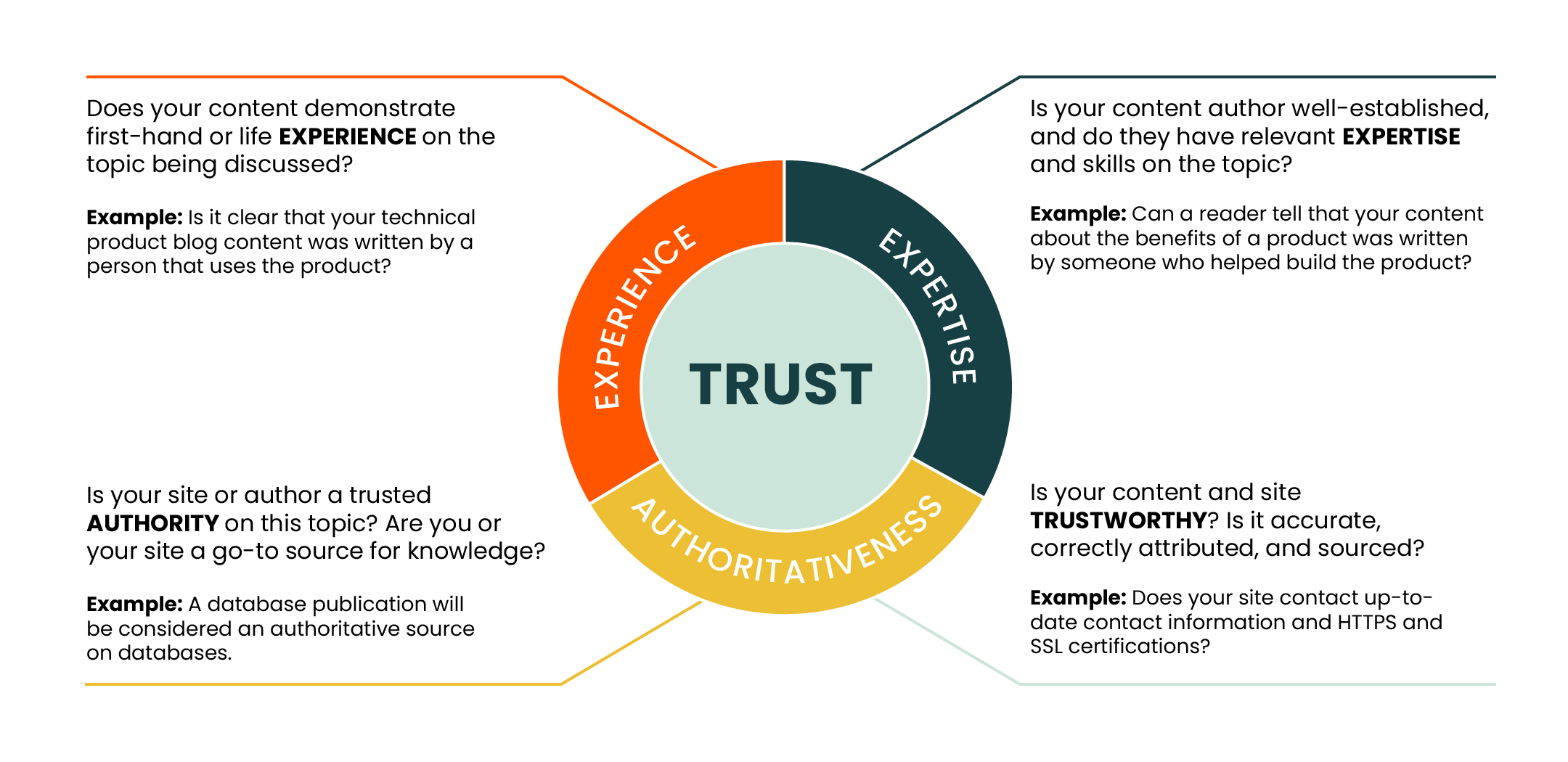
Craft SEO content that covers a topic from top to bottom
Since AI Overviews threaten to hamstring organic traffic — especially answer box Rich Snippets — crafting content around your topics of expertise and clustering that content to create authority is more important than ever. If SGE promises to “do more with a single search” then SEOs must write content that is more comprehensive using the content cluster and anchor technique if they want to be cited as a source in an AI Overview. This technique ensures you are defining a subject with a content anchor, answering questions about that subject in cluster content like glossary pages, and establishing authority with more content clusters that dive even deeper with blog or review pages. By doing this, you are most likely to show in an AI Overview which will also include a link to your page as a corroborated source of information.
Generate more rich content, like images and video
Increasingly, users — especially Gen Z — are turning to TikTok and YouTube for searches, so creating How-to videos, product reviews, webinars, and educational videos is likely going to be more important than ever. These rich media formats, if optimized with keywords, metadata, and structured data from Schema.org will also help to land you in more AI Overviews and increase your reach beyond Google Search, where users are turning to social media influencers across both B2B and B2C to aid in their research and decision making.
AI Overview for “rich content in search results”
Technical optimizations will have increased importance
Google’s AI models still rely on crawling a site’s content to determine whether it follows E-E-A-T principles. Optimizing technical SEO for indexability so crawlers can access and adequately render all on-page content will be crucial for it to show in AI Overviews. Conducting a full SEO audit of your website will help uncover areas in need of improvement, whether core web vitals are suffering or key pages are broken (404). If your site is not performing, it won’t matter how well-written your content is. Additionally, UX on the site becomes more important in a world where every organic visitor carries more weight.
Buy back search real estate with paid search
Paid search has always been a great way to supplement your organic search strategy because you can bid on important keywords to show in Search results where your organic rankings are lagging. This becomes even more vital as AI Overviews take up more visual space at the top of the results pages and leave less room for organic listings. Paid search ads have been confirmed as being part of the new AI Overview experience, so they will remain at the top of the page. Additionally, there will be new creative options for advertisers, like updated image-generation tools to create more ad variations in Display, and the ability to control fonts and colors in Performance Max campaigns. But it remains unclear how AI will help improve the paid search format experience specifically.
The future of B2B SEO remains bright
Google’s new AI Overviews and Search Generative Experience will undoubtedly impact SEO practices, potentially influencing B2C more than B2B businesses. While the specifics of these changes and their effects are still unfolding as Google continues to experiment, it appears that commercial, high-intent, and branded searches will largely remain unaffected, which is beneficial for B2B organizations. Ultimately, the fundamentals of good SEO persist — understanding your audience and crafting quality content for them will always be paramount, ensuring that these innovations can be leveraged to improve overall user engagement.
About the Author
Alastair Nee is Senior Vice President of Digital Marketing at Firebrand, a B2B tech marketing agency based in the San Francisco Bay Area that helps companies grow through creative, data-driven marketing strategy. With a rare left-brain/right-brain approach, Alastair blends sharp analytics with standout creative instincts to build and scale high-performing growth marketing programs that elevate brand profiles and increases their pipeline using the channels and tactics that work best for B2B tech marketing today: GEO/SEO, AI-enhanced paid media, and advanced analytics.
At Firebrand, Alastair leads a team that partners with some of the most innovative names in tech - from AI/ML and data infrastructure to developer tools and B2B SaaS. Over his 17-year career in tech marketing, he has helped launch and grow dozens of companies, delivering award-winning campaigns recognized by The Communicator Awards and other industry benchmarks.
Alastair is a vocal advocate for modern growth marketing and emerging disciplines like AI-powered marketing technology, AI paid media optimization, and Generative Engine Optimization (GEO). His work lives at the intersection of storytelling and performance - where brand meets demand.
Follow Alastair on LinkedIn or explore his thinking on Firebrand’s blog.

